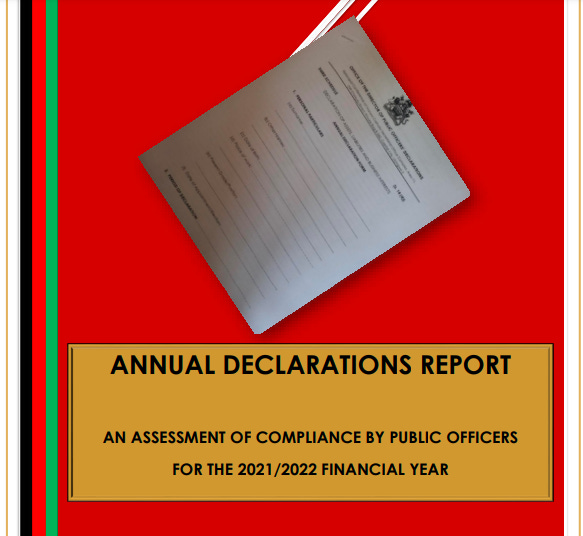Strong Compliance Among Malawian Councils Revealed in Annual Declarations Report
Malawi public officers show strong commitment to asset declarations, writes Winston Mwale.
Lilongwe, Malawi -In the recently released annual declarations report, it has been revealed that a significant number of public officers in Malawi have demonstrated a strong commitment to compliance with asset declaration requirements, writes Winston Mwale.
The report highlights the compliance rates among ward councillors, government ministries, local councils, and agencies in the country.
Impressively, out of a total of 463 ward councillors from 35 councils in Lilongwe, 456 complied with the asset declaration requirements, translating into a high compliance rate of 98%.
This success can be attributed to the intervention of the Monitoring Committee of Parliament, which summoned non-compliant councillors during the 2020–2021 declaration period.
The report also indicates that all 22 government ministries in Lilongwe managed to submit their staff lists for compliance verification, showcasing commendable efforts.
However, ministries, in general, exhibited a lower compliance rate compared to other government agencies.
This could be attributed to frequent transfers among personnel, including desk officers, resulting in poor communication and coordination.
When examining the compliance rates among local councils in Lilongwe, the report reveals an overall 89% compliance rate. Nine councils achieved a perfect compliance rate of 100%, indicating their exemplary commitment to the declaration process. However, the Dedza District Council emerged as the lowest-performing council with a compliance rate of 69%.
Regarding compliance rates among agencies in different regions, the report highlights the eastern region agencies in Lilongwe as having the second-lowest compliance rate after ministries, standing at 69%. Notably, Nasawa Technical College in this region recorded zero compliance.
However, it should be noted that institutions in the eastern region have fewer listed public officers (LPOs) compared to those in the southern and central regions, accounting for only 4% of the total number of LPOs in the public service.
Moving to the southern region, which has the second-highest number of LPOs in Lilongwe, a total of 81% of LPOs in this region complied with the declaration requirements.
However, there were 854 defaulters, with the highest number coming from the Malawi Revenue Authority (MRA), the Department of Immigration and Citizenship Services, and the Agricultural Development and Marketing Corporation (ADMARC). Surprisingly, the Malawi Housing Corporation (MHC) recorded a 0% compliance rate, indicating the need for improved adherence to asset declaration policies.
In the central region, which comprises the majority of declarants at 41% of the total LPOs, an overall compliance rate of 72% was observed.
While 4,284 LPOs submitted their declarations, 1,689 defaulted, representing a 28% default rate.
Additionally, the report highlights nine institutions in the central region whose LPOs did not submit declaration forms, including the National Initiative for Civic Education (NICE) Public Trust, Greenbelt Authority, Nurses and Midwives Council of Malawi, and the Department of Administrator General, among others.
On a positive note, the report showcases the northern region as the best-performing region in terms of compliance, with all nine institutions achieving a perfect 100% compliance rate.
The smaller number of LPOs in these institutions, combined with the commitment of desk officers, contributed to their remarkable performance.
However, it should be noted that the total LPOs in all institutions in the northern region constitute only 2% of the LPO population in the entire public service, primarily due to most public institutions in the northern region being headquartered in the central or southern regions.
To address the identified challenges and improve compliance, the Office of the Director of Public Officers' Declarations (ODPOD) conducted an inquiry to better understand the reasons behind non-compliance.
The inquiry examined a sample of LPOs who were still in contention for compliance with the law and took into account feedback from institutions.
The report identified several reasons contributing to non-compliance. Some LPOs reported having forgotten to submit their declarations despite frequent reminders from the ODPOD and desk officers.
Others were unaware that they fell under the category of public officers required to declare their assets, liabilities, and business interests.
Some LPOs deliberately chose not to submit their declarations, while others were out of the office for various reasons during the submission period. Additionally, listed public officers expressed fear of potential reprisals for their inability to explain the source of their wealth.
The annual declarations report serves as an important tool for assessing compliance rates among public officers in Lilongwe, Malawi.
While there has been commendable progress in terms of compliance, particularly among ward councillors and some government agencies, there are areas that require further improvement.
Ministries and certain regions, such as the eastern region, have exhibited lower compliance rates, highlighting the need for enhanced communication and coordination within these entities.
The ODPOD and relevant authorities are expected to analyse the report's findings and develop strategies to address the identified challenges.
These strategies may include targeted reminders, increased awareness campaigns, and measures to ensure accountability.
By fostering a culture of transparency and accountability, the aim is to promote public trust and confidence in the integrity of public officers and their compliance with asset declaration requirements.
As the new financial year approaches, stakeholders anticipate that the positive compliance trends witnessed in the current report will continue and lead to further improvements in overall compliance rates among public officers in Malawi.
*Download the report below.




